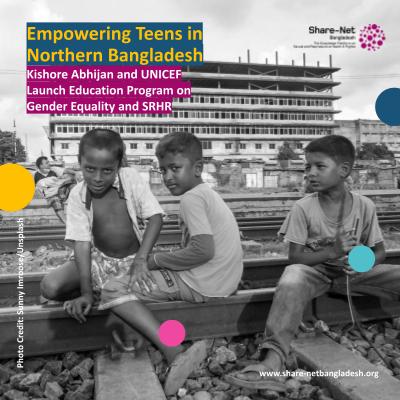Empowering Teens in Northern Bangladesh: Kishore Abhijan and UNICEF Launch Education Program on Gender Equality and SRHR
In a region where traditional views have long dictated the lives of young women, change is blossoming. Saima Akhter, who bravely resisted her family’s plan to marry her off at a young age, now studies in college and dreams of self-reliance. Saima’s story is becoming more common as teenage girls in northern Bangladesh are increasingly aware of their rights, thanks to initiatives like the Kishore Abhijan program.
Funded by UNICEF, Kishore Abhijan focuses on educating teenagers in Rangpur and surrounding areas about gender equality, child marriage, reproductive health, and child labor. This effort is part of a broader movement to empower youth and achieve the Sustainable Development Goals (SDGs), particularly those related to health, education, and gender equality.
Interactive Popular Theatre is at the heart of Kishore Abhijan’s strategy, using folk tales, songs, dances, and dramas to engage and educate. This method not only makes learning relatable but also challenges societal norms about gender roles. Mohammad Rashed from the Center for Mass Education in Science highlights the impact of these campaigns, noting significant reductions in dowry-related violence and increased awareness of women’s health and rights.
The statistics are telling. According to Bangladesh Mahila Parishad, dowry-related violence led to the deaths of 330 women in 2011, a stark contrast to the previous years. However, a survey by Unnayan Onneshan reveals that since 2010, the practice of dowry has been decreasing, and more girls are staying in school. This positive trend aligns with the government’s policies to boost female education and empowerment.
Despite these gains, challenges remain. Dr. Nazneen Akhter, a public health expert, underscores the need for continued awareness and education to overcome family and societal barriers to reproductive health. She points out that while maternal and infant mortality rates have significantly decreased, women still lag behind men in many aspects.
Professor Fariha Hasin from Bangabandhu Sheikh Mujib Medical University emphasizes the importance of starting health awareness campaigns at home. Parents and guardians play a crucial role in educating teenagers about sexual and reproductive health, yet many adolescents prefer to seek information from friends, who may not always have accurate knowledge.
To address these gaps, experts advocate for clear guidelines on how parents, doctors, counselors, and teachers can effectively communicate with teenagers about these crucial issues. Improved health literacy among adolescents is essential for making informed decisions about their bodies and futures.
The government’s commitment to these goals is evident in its efforts to improve healthcare accessibility and quality, particularly in rural areas. Health Minister Dr. Samanta Lal Sen highlights ongoing initiatives to bring healthcare to people’s doorsteps, which aims to reduce patient pressure in urban centers and ensure quality treatment across the country.
The progress in reproductive health education is notable. In the 1990s, only 5% of mothers in villages gave birth with trained midwives; today, that figure is 23%. The use of birth control methods has also risen dramatically from 8% post-1975 to 65% in 2024, reflecting better family planning and reproductive health awareness.
Programs like Kishore Abhijan are crucial for sustaining this momentum. By educating young people about their rights and health, these initiatives contribute to building a more equitable and prosperous society. As Bangladesh continues to advance towards achieving the SDGs, the empowerment of its youth, particularly girls, remains a cornerstone of this progress.
In the words of State Minister for Women and Children Affairs, Simin Hossain Rimi, “Bangladesh is a model country for women’s empowerment, but child marriage is shameful, and by all means, we must prevent it.” Through the combined efforts of the government, NGOs, and communities, the vision of a future where every girl can realize her full potential is within reach.
Source: BSS
Picture Credit: Sunny Imroose/Unsplash


